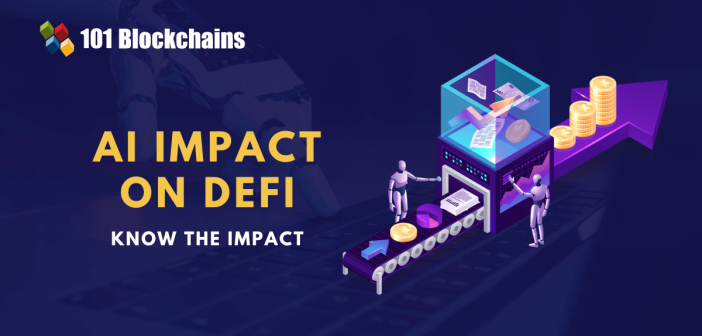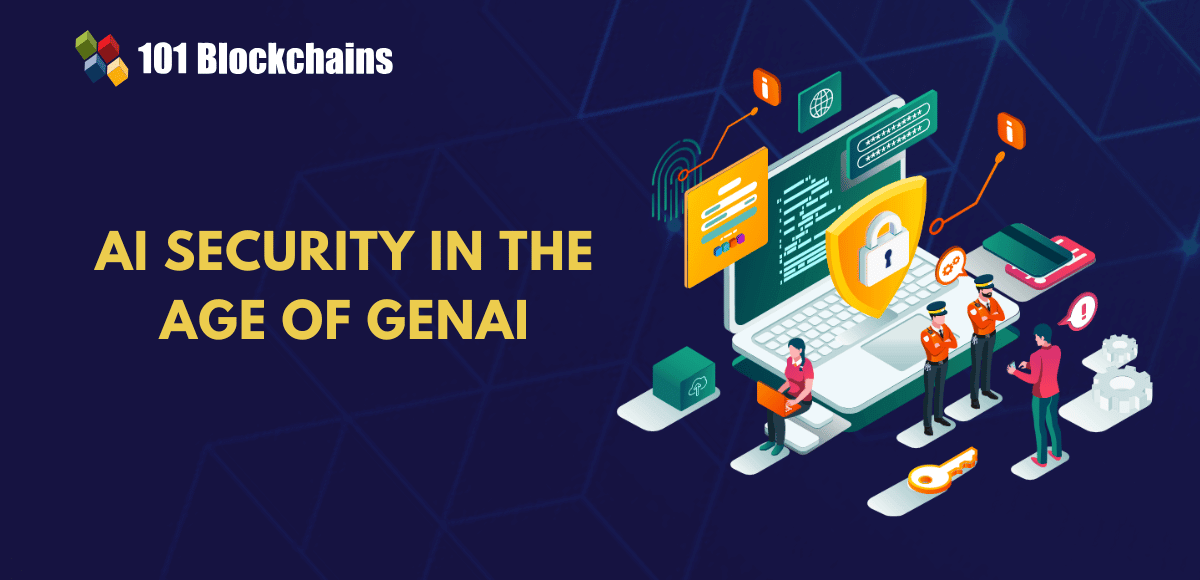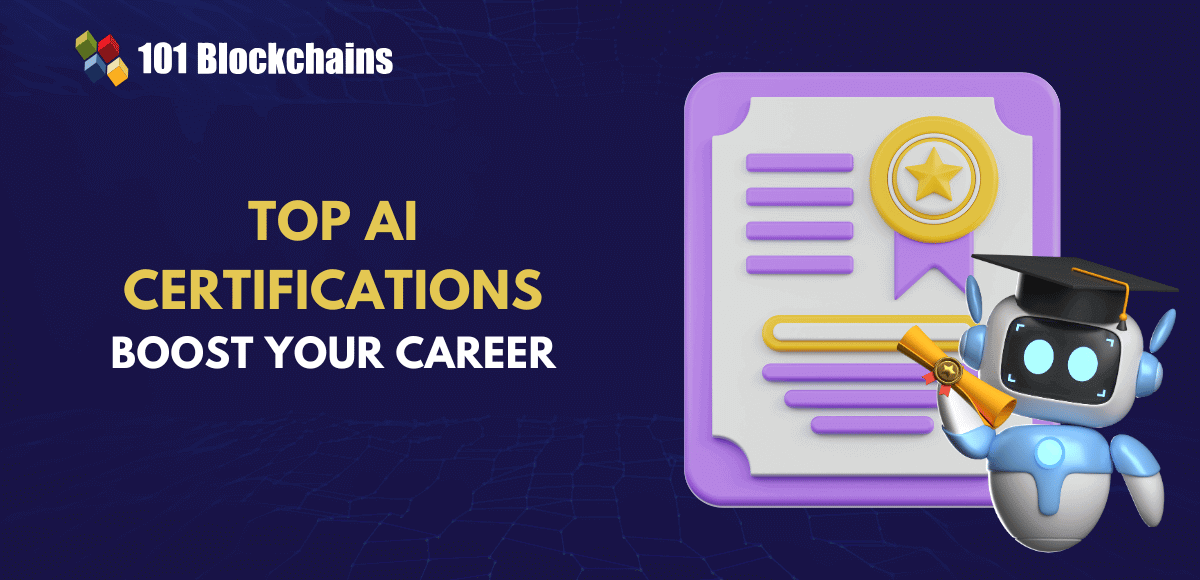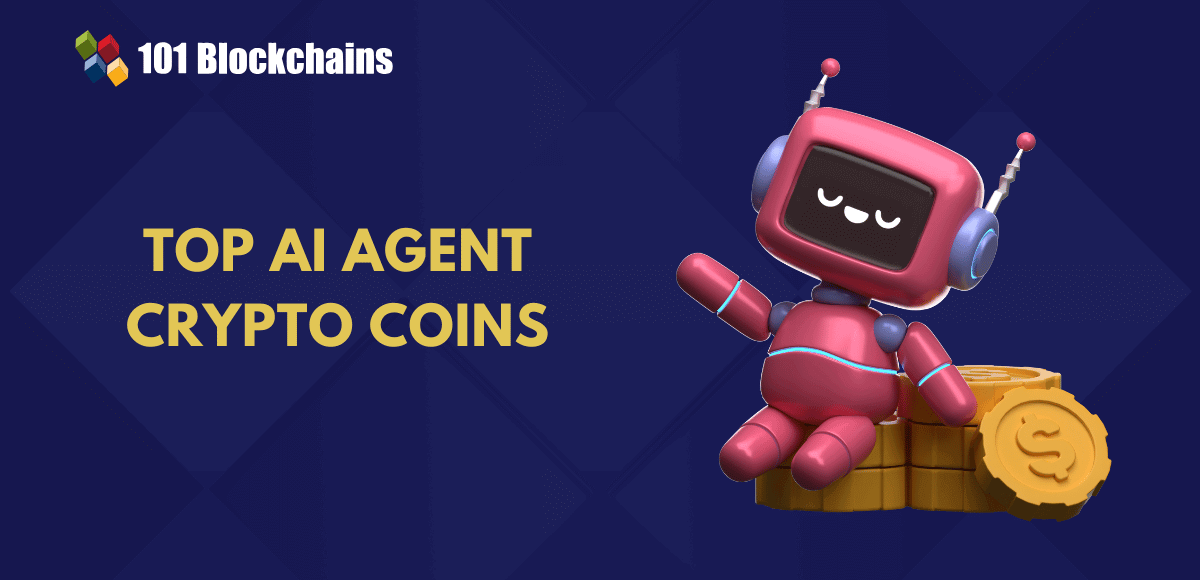Learn how blockchain truly works, master key definitions, and uncover what makes smart contracts so "smart." Dive into the fundamentals, gain valuable insights, and start your blockchain journey today!

- AI & ChatGPT
James Howell
- on July 14, 2023
Potential impact of AI on the DeFi space
Decentralized finance, or DeFi, provided a new angle to the financial services landscape with crucial value advantages. It offered a revised definition of the ways to access financial services through the support of decentralization with blockchain technology. At the same time, AI has also become one of the most notable technology trends with the potential for disruption across multiple industries. Interestingly, many experts have been discussing the AI impact on DeFi, which has delivered many innovative financial services in recent times.
The evolution of DeFi has also invited prospects for implementing AI to provide new definitions for interactions with financial services. The following post helps you learn about the different ways in which AI can improve DeFi solutions.
Why Should You Use AI and DeFi Together?
The foremost doubt in the mind of an individual regarding the adoption of AI in DeFi would point to the reasons for the same. You can find a better explanation for the impact of artificial intelligence on decentralized finance by exploring their definitions. DeFi or Decentralized Finance refers to the new form of enabling access to financial services without any intermediaries. You can also define DeFi as an ecosystem of financial services applications developed on blockchain networks. Some of the notable examples of DeFi solutions include decentralized exchanges, peer-to-peer crypto loans, and liquidity products.
Artificial Intelligence or AI refers to the ability of computers and machines to behave in an intelligent manner like humans. For example, AI can respond to questions from human users like other humans. Common examples of AI applications in financial services include trading bots, chatbots for customer support, and fraud detection tools. You can find answers to “How AI will influence DeFi?” by reflecting on how both of them improve existing financial systems. DeFi has changed the norms of accessibility for different financial service products, while AI has introduced new methods for interacting with financial services.
Want to understand the importance of ethics in AI, ethical frameworks, principles, and challenges? Enroll now in the Ethics Of Artificial Intelligence (AI) Course
Potential Benefits in the Combination of AI and DeFi
The introduction of blockchain technology established the grounds for creating innovative transformations throughout different industries. One of the most prominent sectors which have been influence of blockchain technology is the financial services sector. Blockchain offers the benefits of transparency and better options for scalability of financial services products and solutions.
Market research reports have pointed out that the global blockchain market might be worth almost $1400 billion by 2030. The potential of blockchain creates doubts regarding the role of AI on DeFi by pointing out the reasons why AI is important for DeFi. One of the most convincing reasons for using AI in DeFi refers to the possibilities for optimizing DeFi further. AI can complement innovative developments in DeFi solutions, making them more future-ready than ever.
Experts have pointed out the common links between AI and decentralized finance in different ways. For example, some industry leaders have pointed out that programming languages used for creating blockchains have some form of intelligence. Therefore, the combination of AI and DeFi could help in enhancing smart contract functionalities through programming.
As a result, the AI effect on DeFi can support complex tasks such as DAO governance and automating DeFi optimization. Furthermore, experts have also pointed out that decentralized access to AI through blockchain technology can help people and communities to use AI to resolve different real-world issues.
As the adoption of blockchain and AI continues growing at an unparalleled rate, the convergence of AI and blockchain present viable opportunities for the growth of DeFi. It is also important to note that the introduction of AI in decentralized finance could lead to the development of intelligent DeFi solutions.
Want to explore in-depth about DeFi protocol and its use cases? Enroll Now in Decentralized Finance (Defi) Course- Intermediate Level!
Ways for Implementing AI in Decentralized Finance
The potential of AI for transforming DeFi provides clear indications of the ability of AI for automation. On the other hand, the responses to “How does artificial intelligence help DeFi?” would shed light on other value advantages. Artificial Intelligence can help in leveraging the actual potential of big data.
As a result, it can support DeFi protocols with advanced pattern recognition and data analytics capabilities. Subsequently, the applications of AI in DeFi protocols can play a crucial role in improving risk management and automation of different DeFi processes. In addition, the impact of AI in decentralized finance could also support enhancements in security and optimization of trading strategies.
According to the director of popular crypto exchange, Coinbase, GPT-4 can help in detecting flaws in Ethereum smart contracts. The AI language model can detect different security vulnerabilities alongside pointing out the areas for exploitation of the contract. Interestingly, the AI impact on DeFi could also imply the possibilities for identifying specific methods of smart contract hacks. However, some experts have pointed out that the effectiveness of AI in the domain of DeFi depends on the novelty of the smart contract.
For example, GPT-4 cannot deliver accurate results in smart contract testing in the case of a completely new smart contract. On the other hand, certain DeFi protocols have already utilized AI technology for automation of specific tasks and better services. Here are some of the most promising examples of implementing AI to improve the capabilities of DeFi solutions.
Want to understand the best ways to use DeFi development tools like Solidity, React, and Hardhat? Enroll now in DeFi Development Course!
-
Fraud Detection
The biggest advantage of using artificial intelligence in the DeFi ecosystem points to fraud detection. Fraud is one of the biggest concerns in the DeFi landscape as it provides an effective approach for ensuring security for investments. According to a Chainalysis report, crypto scams accounted for losses worth $14 billion in 2021.
The losses due to DeFi scams have been increasing constantly as hackers deploy exclusive tools for attacks. At this point of time, the role of AI on DeFi would help in using AI algorithms for analyzing blockchain data. As a result, it can support effective detection of market manipulation, fake identities, and phishing scams.
The combination of AI and blockchain could help in enabling security of data storage for preventing or catching cyber-attacks and blockchain fraud. Experts believe that integration of AI can help smart contracts in improving their flexibility for improving efficiency. AI algorithms can support analysis of blockchain data for detecting patterns and anomalies associated with scam activities.
The effect of artificial intelligence on decentralized finance can also imply the use of machine learning algorithms for recognizing patterns related to fraudulent behavior. For example, AI can evaluate large volumes of data for detecting high-frequency trading and other suspicious activities.
Blockchain provides the facility for transparent and permanent documentation of transactions. Artificial intelligence can help in analysis of the data for obtaining insights to improve decision-making alongside addressing privacy concerns. Chainalysis has used AI to detect fraud in crypto and DeFi transactions. The interesting fact about Chainalysis is that financial institutions, cryptocurrency businesses, and law enforcement agencies use the platform to mitigate risk and identify suspicious activity.
Want to learn about the fundamentals of AI and Fintech, Enroll now in AI And Fintech Masterclass
-
Decentralization in Credit Scoring
The next important application of AI in the field of DeFi would refer to a new perspective on credit scoring mechanisms. You can explore answers to “How does artificial intelligence help DeFi?” by reflecting on the abilities of AI for automation. Artificial intelligence can support automation and improves accuracy in different credit assessment mechanisms. AI algorithms have the potential to evaluate massive volumes of data for identification of patterns and make relevant predictions. As a result, lenders could work on ensuring better-informed decisions about approving and denying loan applications.
Decentralized credit scoring has been gaining momentum at a rapid pace with the objective of replacing conventional credit scoring mechanisms. For example, RociFi acquired the funding of $2.7 million in April 2022 for offering credit scoring solutions in DeFi. The AI effect on DeFi would become a necessity as DeFi credit scoring has become popular.
AI can help in improving DeFi credit scoring capabilities. It can support DeFi credit scoring with the help of machine learning models. The machine learning models could evaluate the data regarding financial history of borrowers, their credit score, and other factors which influence the eligibility of a user for credit.
The AI models for DeFi credit scoring can help in identification of patterns and correlations that don’t come to the attention of human analysts. As a result, lenders can ensure accuracy in credit risk assessment alongside favorable interest rates to borrowers with low risk. As of now, the adoption of AI for credit scoring in DeFi solutions has been significantly lower. Interestingly, many platforms have shown interest in adopting AI to improve credit scoring. For example, the DeFi platform CreDA arrived in November 2021 to use AI algorithms to evaluate the credit score of an individual.
Excited to learn the fundamentals of AI applications in business? Enroll now in the AI For Business Course
-
Risk Assessment
The final and most important highlight among the applications of AI for DeFi would point to risk assessment. You should find answers to “How AI will influence DeFi?” in the mechanisms for determining risk. Market trends and economic indicators have a crucial role in improving risk assessment.
At the same time, AI algorithms could help in incorporating elements for better accuracy in risk assessment. According to a study in 2021, data analysis is a crucial tool for determining the risks with DeFi protocols in a quantified manner. The power of data analytics tools with AI can offer flexibility for accurate risk management.
AI algorithms could support the analysis of market trends for identification of potential risks related to economic instability and market volatility. For example, the role of AI on DeFi could point to situations where AI algorithms can detect suspicious increases in frequency and volume of transactions for DeFi protocol. The suspicious patterns can point out evidence for sudden variations in market sentiment alongside possibilities of market manipulation. As a result, investors can identify potential risks and employ necessary remedial actions.
AI has the capability to improve decentralized decision-making through faster analysis of data with better accuracy in predictions. On top of it, AI-based risk assessment models could help in analysis of economic indicators, such as GDP growth and inflation rates. Therefore, the effect of artificial intelligence in DeFi could support the assessment of overall economy alongside the state of the DeFi ecosystem.
Learn the fundamentals of Decentralized Finance (DeFi) with DeFi Flashcards
Limitations for Employing AI in DeFi
The advantages associated with the impact of artificial intelligence on decentralized finance provide viable reasons for adopting AI in DeFi. On the other hand, it is also important to look out for the challenges that can affect the use of AI and DeFi in combination. Here are the notable challenges for implementation of AI in DeFi.
-
Legal Challenges
The foremost set of challenges associated with implementation of AI in DeFi would point to legal and regulatory challenges. For example, AI algorithms should maintain compliance with regulatory requirements and data privacy regulations like GDPR. In addition, AI algorithms for DeFi security assessments must follow the KYC and AML regulations to avoid penalties.
-
Ethical Challenges
The review of AI impact on DeFi would also draw attention to the ethical challenges. Ethical challenges are a crucial obstacle for implementing AI and DeFi while ensuring unbiased and transparent operations. Privacy serves as an important concern as AI tools work on collection and analysis of massive volumes of user data. Transparency provides the assurance of a clear explanation for the decision-making process of an algorithm. AI algorithms used in DeFi use cases should help in addressing crucial implications related to data privacy concerns.
Understand the true potential of generative AI and become an expert with the Generative AI skill path
Conclusion
The review of important factors associated with the impact of AI on DeFi showed that artificial intelligence could improve DeFi. Decentralized finance offers a new and innovative method for accessing financial services. At the same time, it is also important to note that the AI effect on DeFi could lead to improvements. You can always seek the scope for improvement in DeFi ecosystem through AI by enabling the benefits of data analytics.
Artificial intelligence can browse through huge repositories of DeFi user data to determine anomalies in behavior of users or determine risk in specific investments. Learn more about the potential of AI for transforming DeFi with new and powerful functionalities. Take a deep dive into the potential of artificial intelligence in DeFi with practical examples and a review of existing challenges in DeFi right now.
*Disclaimer: The article should not be taken as, and is not intended to provide any investment advice. Claims made in this article do not constitute investment advice and should not be taken as such. 101 Blockchains shall not be responsible for any loss sustained by any person who relies on this article. Do your own research!






